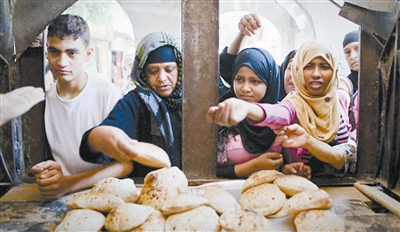埃及面包危机
In Egypt, a shortage of subsidized bread has resulted in long lines and occasional clashes in which several people have been killed. The president has ordered the army to use its bakeries to try to end the bread crisis, but the roots of the problem are more than just simple supply and demand.Rising food prices and poverty have combined with corruption to create a bread problem that will not be easily solved.
在埃及,由政府补贴的平价面包出现短缺,结果买面包的队伍越来越长甚至发生冲突,造成人员死亡。埃及总统命令军方的面包房向市场供货,以求缓解面包危机。不过,这场危机的根源并不仅限 于供求失衡。食品涨价、贫困以及腐败等问题交织在一起,才造成了 这个棘手难题.
About 30 people are crowding around two small windows at a Cairo bakery, shouting at each other and jostling for the best place in line. The heat is blistering already, and women in the crowd shade themselves from the sun with plastic bags.
在开罗的一家面包店的两扇狭小的窗前,大约有3等候买面 包的顾客吵吵嚷嚷地挤成一团。炎炎烈日下,人群里的妇女只好把 塑料袋罩在头上遮阳。
A woman named Fatma says she waits here for two to three hours every day to buy bread for her family of five.
一名叫法塔玛的女顾客说,为了一家5口人能吃上饭,她每天都 要在这里排上两三个小时的队。
Gesturing toward the chaos at the bakery window, she says, “What can I say? You can see this bread problem for yourself. The prices of everything have gotten so high.”
法塔玛指着眼前乱作一团的景象,无可奈何地表示能说什么呢?面包的问题大家有目共睹。什么东西现在都贵得离谱。”

This bakery is selling round loaves of government-subsidized bread, known locally as “balady” or country bread. The price is fixed at five Egyptian piasters, or less than one US cent a loaf.
这家面包店卖的是政府补贴的平价圆面包。当地人把这种面包称为“巴拉迪”,就是乡下面包的意思^这种面包的单价固定在5个皮阿斯特,还不到1美分。
In recent months, rising food prices have fueled a shortage of this subsidized bread, leading to long lines and short tempers. Several people have been killed in fighting that has broken out in bread lines or clashes between customers and bakers.
最近几个月来,食品涨价导致这种平价面包出现短缺。于是,排队买面包的队伍越来越长,情绪也越来越焦躁。抢购面包引发的冲 突已经造成几人死亡。
“All other food prices have risen. There are a lot of food prices which rose sizably look at the oil price for instance, rice,sugar, everything is rising~but balady bread has been kept at five piasters a loaf, and the flour which goes into it is delivered at a much lower price while the baker can sell it on the black market at several times the price,,’ said Kheir el-Din.
Kheirel-Din说:“其他食品都在涨价。很多食品涨幅相当大,比如食用油、大米、糖等等,这些都在涨。但是巴拉迪面包的价格始终固定在5个皮阿斯特。烘烤这 些平价面包的面粉也是低价进的,但是面包房可以在黑市上以几倍的价钱出售这些面包。”
The corruption is not limited to selling subsidized wheat flour on the black market.
有人把平价面包拿到黑市上高价出售只是腐败现象的表现之一。
At the bakery, a heavy metal door swings open and then clangs shut quickly, and a man scurries away holding five round pieces of freshly baked bread.
在一家面包店,一扇沉重的金属门突然打开,然后又很快地关上。一名男子捧着5个刚刚出炉的圆面包迅速离去。
Another man who gives his name only as Samir waves his hand angrily toward the door.
面包店前,一位名叫萨米尔的男子手指面包店,忿忿不平。
He says the bakery employees let some people inside to get bread quickly while he and the rest are waiting in line outside in the sun for hours.
萨米尔抱怨说,面包店的工作人员让一些人插队买到面包,而他和其他顾客却要在炎热的太 阳下苦等几个小时。
In Egypt, the bread crisis is a symptom of a larger problem~one of stagnant wages that have failed to keep up with the cost of living. There is no shortage of bread for those willing and able to pay higher prices for it Some people who buy the subsidized product resell it just down the street for twice the price. And unsubsidized bread is in plentiful supply at local markets, but that costs five times as much.
在埃及,面包危机只是一个表象,其深层问题是工资停滞不前,而生活开支却在不断增长。对 于那些能够并且愿意支付高昂价格的人来说,并不存在面包短缺问题。一些购买了平价面包的人 走到街道另一端,转手就以双倍的价格卖掉。在地方市场上,议价面包随处可见,但价格往往是平 价面包的5倍左右。
Fatma says the unsubsidized bread is too expensive, and the loaves are smaller than the real balady ones. She says she simply cannot afford to feed her children that way.
法塔玛说,议价面包太贵,个头也不如巴拉迪面包那么大,所以她根本没有办法靠议价面包养 活她的孩子。
She says her family of five lives on a single pension of only 350 Egyptian pounds a month,or just over $ 60. That is similar to the wages earned by civil servants and factory workers, and even doctors in public hospitals.
她说,她们一家5 口人的全部收入来源只有每个月350埃磅的补助金,这笔钱折合一下大约是 60美元。埃及的公务员、工人,甚至国营医院的医生也就挣这么多钱。
Fatma says each of her family members eats two pieces of bread a day. If she had to buy unsubsidized bread at five cents apiece, she would end up spending about one quarter of her monthly income on bread alone.
法塔玛说,她家每人每天吃两块面包。如果花上5倍的价钱买议价面包的话,她们家每个月光是买面包就要花掉收人的1/4。
At the bakery, Fatma sighs as she stares at the raucous crowd pushing and shoving to get closer to the front. She shakes her head and moves into line, saying under her breath, “May God have mercy on the poor."
在面包店,法塔玛看着眼前挤成一团的顾客,无可奈何地叹了口气。她摇了摇头,小声嘀咕了 —句“老天保佑穷人”,然后向人群里挤去。



